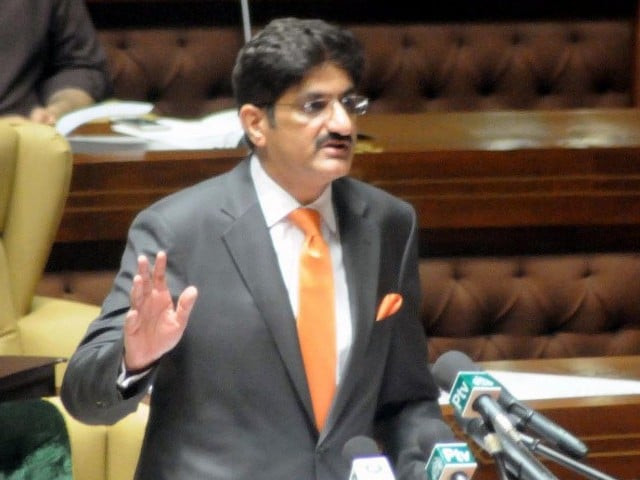Murad blames FBR’s ‘poor’ revenue collection for Sindh’s dismal infrastructure
Visits rain-hit areas in province; promises collecting funds for constructing stormwater drain in Thatta

Sindh Chief Minister Syed Murad Ali Shah said on Wednesday that a shortfall in revenue collection over the last three years by the Federal Board of Revenue (FBR) brought development endeavours in Sindh to a standstill.
On a visit to rain-hit districts of the province, the Sindh chief minister observed that the provincial government could not fulfill its commitments on various projects owing to FBR's poor revenue collection.
Briefing the media during his visit to districts badly affected by Tuesday's rains, the CM said he began his visit from Malir, in Karachi, where the flow of rainwater in the Malir and Sukkur rivers was badly affected owing to encroachments. The water ended up inundating various villages in the process, such as Mohammadi Town, Yar Mohammad village, Koohi, Darsano Chhano and Hassan Panhwar.
According to Murad, 108 people - including 22 from Koohi, 30 from Darsano Chhano and 56 from Hassan Panhwar - had so far been evacuated with the help of armed forces. However, "people are still stuck in Mohammadi Town and Yar Mohammad Panhwar villages,” the CM said.
He added that commissioner Karachi had been directed to rescue the people from these villages with the help of Pak Navy and Army officials, and provide them food and water.
CM Murad further said that encroachments on Malir and Sukkur rivers were so dense that hardly 10 percent area was left for rainwater to flow. “We will now have to remove the encroachments, otherwise urban floods will be inevitable,” he said.
In response to a question, the CM said that rainwater had accumulated along the road and inundated some portions in Gharo. “I have observed that culverts will need to be installed along the road to provide a passage for the water to flow," he said, adding that work on their installation will be started shortly.
To another question, the CM stated that rainwater had been disposed of from Thatta city, in some places it drained naturally, while in others suction machines had to be used. "However, the solution of these issues lay in construction of a new stormwater drain," the CM stated.
“A storm water drain has been a part of our development plan, but we work on it could not commence owing to resource constraints,” Murad claimed.
According to the CM, revenue collections by FBR were remained dismal throughout 2018 and 2019, whereas in 2020 both the national and provincial economies suffered serious damaged due to Covid-19. These factors affected the completion of development works, observed the chief minister. “However, we’ll arrange funds for construction of stormwater drain in Thatta,” he vowed.
In the CM's view, this year's rains caused thte least amount of damage, in terms of human lives and public property, as compared to last year.
Sujawal
The chief minister visited Sujawal, where rainwater had already been drained, but low-lying areas such as Ismail Gurmani and Allah Warayo Sirani were still submerged under water.
CM's Advisor, Aijaz Shah Shirazi, briefed him about the situation in the district. The CM directed PHE Secretary Laiq Ahmed to bring in more suction machines from Thatta and Badin to Sujawal for disposal of water.
Badin
In Badin, Sindh Chief Minister Syed Murad Ali Shah stopped to visit the Guni and Phuleli canals. Chief Engineer Zarif Khero told the CM that the Guni canal carried water of three talukas, Matli, Golarchi and Tando Mohammad Khan, and discharge it further Into Nareri.
The Guni-Phuleli canal has a design discharge of 1,500 cusec, but presently 1,800 cusec water was flowing through it safely.
The people of Badin requested the chief minister to construct a separate stormwater drain in the city for disposal of rainwater and domestic waste water. On which, Murad assured the people that the government would conduct a feasibility study of the drain.
Mithi
During his visit to district Tharparkar, Murad visited Diplo, where 509 mm rainfall was recorded. Some other areas that received heavy rainfall were Islamkot (330 mm), Mithi (459 mm), Kaloi (215 mm), Chachhro (267 mm), Dahli (240 mm) and Nagarparkar (387 mm).
Thar Deputy Commissioner Nawaz Sohu told the chief minister that rainwater was being disposed of through suction machines provided by PHE. Meanwhile, cooked food was also being provided to the affected people.
Murad was further informed that rehabilitation work was in progress.



















COMMENTS
Comments are moderated and generally will be posted if they are on-topic and not abusive.
For more information, please see our Comments FAQ